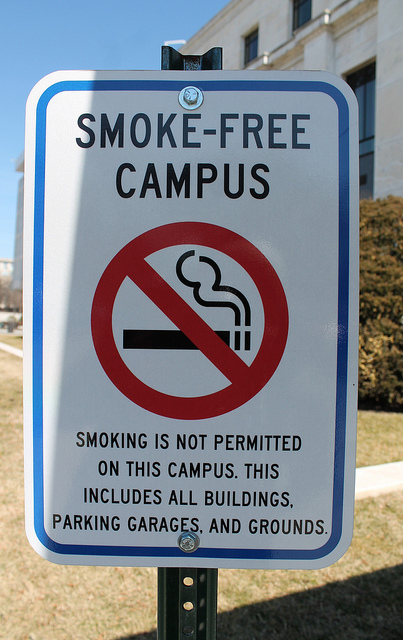
TORONTO — A growing number of university and college campuses across the country are now fully smoke-free — both indoors and out, says a report by the Canadian Cancer Society released Thursday.
The report says there are now 65 post-secondary institutions that prohibit smoking anywhere on campus, more than double the number in 2017, when 30 colleges and university campuses had implemented smoke-free policies. That’s also a dramatic rise from a decade earlier, when only four such institutions had full smoking bans.
Dalhousie University in Halifax was among the first to make its campus 100 per cent smoke-free, in 2003. Those that have followed include the University of Regina, McMaster University in Hamilton and George Brown College in Toronto.
“The trend is accelerating,” Rob Cunningham, senior policy analyst at the Canadian Cancer Society, said from Ottawa. “We’ve seen the feasibility at various colleges and universities doing it, which then prompts encouragement to nearby institutions to do the same thing.
“That’s positive because not only is there protection from second-hand smoke, but it’s a great motivator for smokers to quit because it’s less convenient.”
Of the universities and colleges that are smoke-free, many have policies that also apply to cannabis, hookah smoking and e-cigarettes.
But next month’s legalization of recreational marijuana is spurring many post-secondary institutions to strengthen current smoke-free policies and may prod others to bring in their own bans.
“Suddenly, it’s going to be legal to smoke cannabis. There are many underage students,” said Cunningham, noting that depending on the province, those under the age of 18 or 19 are prohibited from smoking pot.
The easiest thing for all of the country’s 260 colleges and universities to do, he said, “is to say you can’t smoke anything anywhere on campus.”
At the University of Toronto, students have long been banned from smoking tobacco in residences and “the same will apply for smoking cannabis,” spokesperson Elizabeth Church said by email.
The university is reviewing its smoking policy for all three if its campuses, which bans smoking in buildings or “anywhere prohibited by law,” she said.
“Under Ontario’s Cannabis Act, use of cannabis will be banned in all workplaces and public spaces. At U of T, that includes offices, classrooms, libraries, athletic facilities, and campus grounds.”
The University of British Columbia is also in the midst of revising its smoking policies for both the Vancouver and Okanagan campuses, with proposed changes to be presented to the institution’s board on Sept. 27, followed by a public consultation.
Currently, the Vancouver campus bans tobacco and cannabis smoking in buildings, bus shelters, inside university vehicles, and within eight metres of doors and air-intake vents, said UBC lawyer Michael Serebriakov. At the Okanagan campus in Kelowna, B.C., smoking is prohibited everywhere except in designated gazebos.
“The current version of the policy does not impose 100 per cent smoking ban on either of the campuses,” he said.
“We have to take into consideration the legal rights of cannabis and tobacco smokers as well as consideration of people who are vulnerable to the impact of second-hand smoke. So at this point there is no general prohibition.”
Under the proposed policy changes, “cannabis and tobacco smoking and vaping will be treated in the same way as tobacco smoking is treated under the current policy,” said Serebriakov, noting that the revised version is expected to be finalized and approved in early 2019.
The Canadian Cancer Society is also concerned about the growing prevalence of vaping, particularly among youth — a phenomenon the commissioner of the U.S. Food and Drug Administration characterized this week as an “epidemic of addiction,” mainly driven by flavoured products.
“Most campuses adopting policies are applying them to smoking of anything, including cannabis, and applying it to e-cigarettes as well,” said Cunningham.
“But it is good for policies to be comprehensive,” he said. “One of the reasons for that is that you can consume cannabis through an e-cigarette. That’s part of the context of why there shouldn’t be vaping either on campus.”